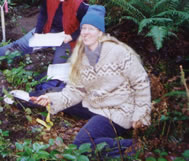Graduate Students:
Vikki Blouin, MSc Graduate, 2004
Effects of mechanical disturbance on soil properties and lodgepole pine growth in British Columbia's Central Interior
Abstract
Increased mechanization during timber harvesting activities has led to concerns that compaction may negatively affect the long-term productivity of soil. A greenhouse study was carried out to determine the effects of soil compaction under three levels of soil water content. Mineral soil was collected from a landing in central British Columbia, Canada and lodgepole pine (Pinus contorta Dougl. ex Loud. var. latifolia Engelm.) seedlings were grown in pots for 12 weeks. Pots were compacted to densities that corresponded to 67, 72 and 76% of the Proctor maximum bulk density (1798 kg m-3) for the soil. Volumetric water contents of 0.10-0.15, 0.20-0.30 and 0.30-0.35 cm3cm-3 were maintained by weighing the pots, determining the gravimetric water content and adding the required water. Compaction only had an effect on seedling growth at low water content. Diameter growth and total shoot biomass were significantly smaller for 76% compaction compared to 67% compaction. At low water content, 76% and 72% compaction caused decreases in new root biomass and 76% compaction increased shoot macronutrient concentrations. The findings of this study imply that, for the compaction levels observed, water content had a greater impact on seedling growth than compaction.
To see the rest of Vikki's Presentation at SuperSoil 2004:
Back to mechanical site preparation
